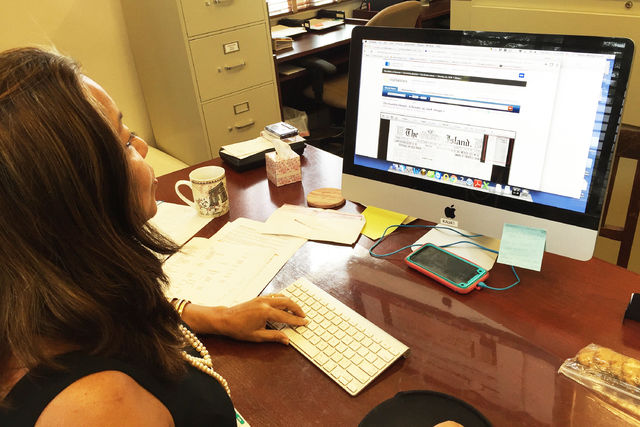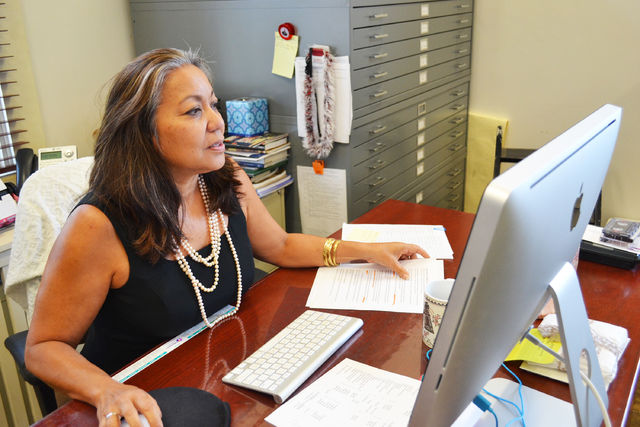LIHUE — Helen Wong Smith never dreamed of receiving one of the top honors in her profession.
“When they told me, I cried,” said the archivist of 35 years and Kauai Historical Society director.
For the first time in 47 years, the Society of American Archivists elected an SAA member from Hawaii as a Fellow of the Society of American Archivists. Members are chosen for their outstanding contributions to the archival profession.
The last Hawaii person to be elected a fellow was state archivist Agnes Conrad in 1969.
Wong Smith, who commutes from Hilo to Kauai every week to work, was elected after introducing an idea that would help diversify her profession as well as the records of archives throughout the nation.
Traditionally, Wong Smith said archives consisted of records of affluent or well-known individuals and families.
“How about collecting the things of all us worker bees?” she said this week while working in the Historic Society office in the Historic County Building.
In order to solve this problem, Wong Smith introduced what she calls “cultural competency,” something anyone who grew up in the islands may be familiar with.
“It’s almost innate; just by virtue of our diversity here and to be able to work and live with people who are very much unlike ourselves,” she said. “It’s a whole precept of learning how to deal with people unlike yourself.”
The same goes for archival records.
“What about the material of the unknown: People who didn’t own a lot of land and weren’t judges or captains of the industry or plantation managers?” Smith said. “These are records that should be saved.”
After giving a two-hour workshop on the concept in May 2015, Wong Smith said the SAA council adopted the development process of cultural diversity competency for its 6,000-plus members.
“How are (archivists) to expand the archival record and share the importance of archives as essential evidence of society, especially to traditionally underrepresented communities in our collections, if we are unable to effectively work and communicate with a diversity of cultures?” Wong Smith said at an SAA annual meeting in Cleveland in 2015.
Wong Smith has the respect and admiration of her peers.
In nomination papers, Kristen Anderson, director of Health Sciences Library at the University of Hawaii, wrote: “Helen Wong Smith has an uncany ability to think outside the box. She is not limited by perceived boundaries but is willing to take on jobs others might balk at.”
Jan Zastrow, archivist with the U.S. Senate, wrote: “Helen embodies the best and brightest in our field. She is a leader of extraordinary talent and ability. Her commitment to the archival profession is evident through her vitae of publications, presentations, grant awards, and tireless service to both her community and the profession.”
And Michelle Light, director of special collections, University of Nevada, Las Vegas Libraries, had this to say: “Helen challenged us to think of diversity beyond ethnic groups. Helen explained that cultural competence means having an awareness of your own cultural identity, the willingness to learn about the different cultural norms of others, and the ability to interact effectively with people who don’t share your norms.”
Wong Smith enjoys constantly learning as an archivist. She also enjoys putting people in touch with resources they didn’t know existed.
“They come to you with a question and then you are able to share (your findings) with them,” she said. “It’s just so rewarding to give people more that what they expected.”
Although libraries and archives are both resources of information , there is one main difference between the two, Wong Smith said.
“Libraries are full of published materials: If anything happens to this copy, there’s usually another copy somewhere in the world,” she said. “Unpublished archives are unpublished materials. This is the only map of this particular area or this is the only photo. These are unique resources.”
Wong Smith was hired in August to lead the Kauai Historical Society. She hopes to engage more local residents to join the society.
“KHS is far beyond other islands as far as the information that’s available to everybody,” she said. “To have the finding aids up there as rich as they are, they’re very well done. Anybody can do this research.”






